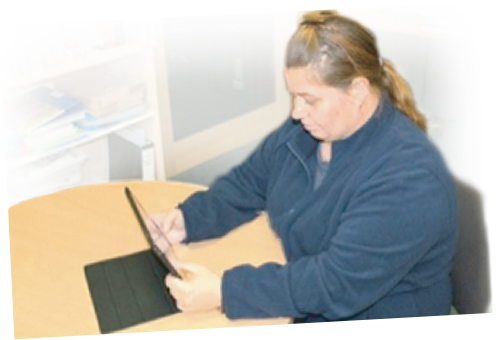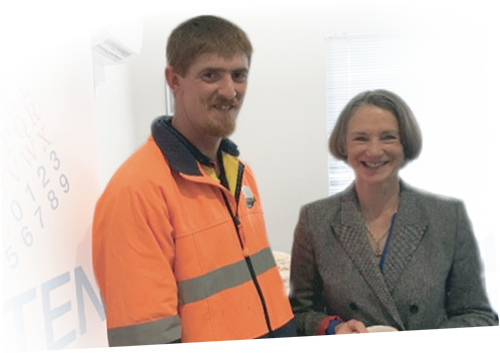26TEN Tasmania: Tasmania’s strategy for
adult literacy & numeracy 2016-2025
2016 Progress Report
26TEN Tasmania is a long-term strategy for all of Tasmania. It sets a framework for action by the whole state – business, community groups, government, education and training providers and individuals who want to live in a state where all adults have the reading, writing, numeracy and communication skills they need for life.
The strategy is recognised nationally and internationally as a ground-breaking communitywide approach to tackling a problem faced across the globe.
This report provides progress against the strategy. After five years, we will look at how far we have come as a state and what we have learnt in more detail.
We assess our success through statistics and through stories that show the impact of 26TEN.
Our statistical targets are ambitious, population-level targets for increased awareness, increased adult literacy and numeracy skills levels, and increased commitment to clear communication. We will reach these goals over the ten year period if we all work together.
We have reported against a range of markers set to measure successful progress in the 26TEN Action Plan October 2015-October 2017, against the three goals of 26TEN.
In the 12 months since the launch of 26TEN Tasmania, we have already made good progress against the two-year action plan. In 2017 we will continue this work.

48%* of Tasmanians do not
have the literacy and numeracy
skills they need for life in a
technologically-rich world.

598 member
organisations and
supporters have taken
action and joined 26TEN

86 workshops have
helped people with clear
communication and
literacy awareness.
Goals
GOAL 1
Everyone knows about adult literacy and numeracy
An increased level of 26TEN activity is helping us achieve this goal, with a 26TEN Network of close to 600 members and supporters. With over 42 new organisational members and 396 new individual supporters since October 2015 (more than double the two year target), we know that awareness of the 26TEN brand and messages is growing. In 2016:
- the 26TEN website had more visitors (an increase of 17 per cent over the year)
- the number of people “liking” our Facebook page reached 844 and we became active on Twitter
- calls to the 26TEN telephone hotline increased to 238
- our popular 26TEN Literacy Awareness workshop was updated and delivered to 450 participants in 32 sessions across the state.
We have received positive feedback from the 26TEN members throughout the year. Critical to this has been an additional 26TEN staff member dedicated to supporting members, the new 26TEN newsletter News and Numbers (launched in April 2016) and dedicated events in 26TEN week (24-28 October 2016). This helped those involved with 26TEN to feel engaged with the collective effort.
The expanded 26TEN Coalition developed clear and practical plans for specific sectors of focus (civil construction, health, education, media, legal, local and state government). These led to new members and activity in support of adult literacy and numeracy in these sectors.
Key sectoral highlights were:
- the establishment of the Health Literacy Network under the umbrella of 26TEN
- the first referrals by health professionals to the LINC literacy network
- inclusion of 26TEN in the Healthy Tasmania 10-year plan
- plain English training for the UTAS law faculty
- construction industry breakfast forums on workplace literacy
- increasing media awareness of 26TEN.
26TEN explored engagement with the Aboriginal population in various ways, from small projects with specific communities in St Helens, Glenorchy and the Huon Valley, to exploring indigenous issues at the national level through engagement with the National Indigenous Leadership Conference. This work will continue in 2017.
During 2016, 26TEN became a valued participant in broader education debates in Tasmania. We contributed to discussions about the educational attainment of Tasmanian children, showing that helping parents raise their literacy and numeracy skills will improve outcomes for their children. LINC Tasmania worked with the Underwood Centre on behalf of 26TEN to develop a joint proposal for longitudinal research on adult literacy and parental engagement in education. 26TEN was highlighted nationally as an effective literacy program as part of the SBS Insight television program about the everyday challenges faced by Australians who have low literacy and numeracy.
Case Study
Getting the literacy skills to get online
Angela’s story of the LINC Tasmania literacy service
when she felt her problems with reading and writing made her look stupid. “I felt terrified about people knowing because I didn’t want them thinking I was dumb,” she said. Angela was referred to Glenorchy LINC and started working oneon- one with a tutor.
“I didn’t think it was going to help but it is, although I wish I could make even faster progress. I’m working really hard.” Since working with her tutor, Angela has built her skills and taken computer courses, with plans to do more.
“At Glenorchy LINC I also did a four-week basic computing course. I was terrified at first. After a couple of weeks I started to like it a lot. Then I did ‘First Steps’ and ‘Prepare for Computing.’ Angela’s confidence has grown by improving her literacy skills and realising that she can get online.
“Before I was terrified of doing lots of things that other people take for granted, like catching a bus and buying a Greencard.” Many Tasmanians use the Greencard to pay for bus travel and to get a 20 per cent discount on the fare, but the online application form was previously difficult for Angela to complete.
“I got a Greencard by myself recently and this was a very big deal for me,” said Angela.
Her advice to others is to get some help. “You’ve got to do it! It will help you with other things in life. I was stuck in a bubble. Now I’m doing lots of things and I have made new friends.”

Goals
GOAL 2
Everyone is supported to improve their skills
and to help others
26TEN members who provide direct literacy support, including private training organisations, have helped thousands of Tasmanians to improve their literacy and numeracy skills in 2016.
Through the LINC Tasmania literacy service, close to 2,000 Tasmanians received support tailored to their individual needs, with positive outcomes including increased literacy and numeracy skills and confidence. Over 417 Tasmanians volunteered their time during 2016 as literacy tutors with LINC Tasmania, many also engaging with 26TEN in other ways. The LINC Tasmania literacy service played an active role in promoting 26TEN and literacy awareness in local communities throughout the state.
The 26TEN grants program supported 14 businesses to improve the literacy and numeracy skills of their employees and improve the accessibility of their workplaces to people with low literacy and numeracy. Joining Circular Head, Burnie, Huon and Derwent Valley, St Helens was also supported by a 26TEN community grant.
In 2016, 26TEN contributed to better and more readily available literacy and numeracy support for Tasmanian adults by offering high-quality, professional development to Tasmania’s adult literacy and numeracy workforce. Over 155 practitioners were trained throughout the year, including independent contractors and staff from private registered training organisations, LINC Tasmania and TasTAFE. 26TEN subsidised eight practitioners to gain three units of the Graduate Diploma of Language Literacy and Numeracy (LLN) Practice through training organised by LINC Tasmania. We established a group of literacy providers interested in cooperating to strengthen the LLN workforce and will expand this discussion in 2017 with government agencies that fund and support adult literacy provision.
26TEN also made it simpler for people to find the help they need by continuing to improve the responsiveness of the 26TEN telephone hotline. The new 26TEN website, launched in October 2015, has made it easier for individuals, businesses and communities to understand how they can help the collective effort.
Case Study
Promoted at work and inspiring others
Jade’s story of a 26TEN grant
When Houston’s Farm received a 26TEN grant to build literacy and numeracy skills in staff at their Cambridge factory, Jade was one of the first to take part. He worked with Anne, an adult literacy support officer, who was employed as part of the grant.
“I didn’t really like the idea of having to actually ask someone for help,” said Jade. But once he started getting help with spelling, grammar and oral communication, things just got easier.
“Anne’s really nice. She knows you’re an adult, but she explains things to you in the easiest possible way to learn.

“It’s helped me improve my job in the factory and made it so I can go higher up in the factory too,” he said.
Jade’s improved skills have been recognised as he now steps up when his supervisor is on holidays. The Chairman of Houston’s Farm has also noticed. “Anthony Houston and a couple of the other leaders have all congratulated me on how I’ve picked up my skills,” said Jade. An added benefit is that Jade is now more confident helping his own children with spelling and grammar.
Inspired by his example, a couple of Jade’s colleagues, who were reluctant to participate in the initial program, are now receiving support from Anne who says Jade is a great ambassador for 26TEN.
Jade’s advice to all is, “Don’t be scared. It can only help you. So put your hand up straight away. There’s no shame in being out to learn.”
Goals
GOAL 3
Everyone communicates clearly
A month-long 26TEN plain English promotion in May 2016 led to enthusiasm for clear communication in a range of sectors.
The 26TEN health literacy network started a campaign to recognise good practice in clear communication by health service providers. Service Tasmania began a pilot of a number of plain English forms to demonstrate efficiency gains, as part of the 26TEN State Government sector plan supported by Heads of Agencies. LINC Tasmania began work to ensure internal processes supported, rather than hampered, the use of plain English. The Department of Education offered plain English training to principals and senior staff focused on newsletters and report writing, to support clear communication with parents.
26TEN plain English trainers delivered 53 workshops to over 600 participants from a range of organisations and groups. These were met with enthusiasm and ongoing commitment from many organisations. Plain English was included as a key action area in 22 new 26TEN member plans in 2016.
Away from home, 26TEN presented at the 2016 International Clarity Conference in Auckland, New Zealand on how it uses collective impact, a model for social change, to help spread the use of plain language to make a real difference to the lives of people with low literacy and numeracy skills.